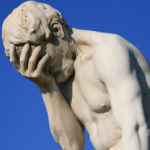 It’s pretty well established that we have any number of cognitive biases that muddy and distort our thinking. Indeed, earlier this year I wrote about a study that explored just how powerful these biases were.
It’s pretty well established that we have any number of cognitive biases that muddy and distort our thinking. Indeed, earlier this year I wrote about a study that explored just how powerful these biases were.
It found that when information was supportive of their belief it was used to reinforce it, but when the information was not, the participants sought to discredit the information as much as possible.
Interestingly, we all tend to be much better at spotting such biases in other people than we are in ourselves. A recent study saw the creation of a tool that can be used to measure our bias blind spot.
Why the bias blind spot matters
“When physicians receive gifts from pharmaceutical companies, they may claim that the gifts do not affect their decisions about what medicine to prescribe because they have no memory of the gifts biasing their prescriptions. However, if you ask them whether a gift might unconsciously bias the decisions of other physicians, most will agree that other physicians are unconsciously biased by the gifts, while continuing to believe that their own decisions are not. This disparity is the bias blind spot, and occurs for everyone, for many different types of judgments and decisions,” the authors say.
The research consisted of five different experiments. The first two of these created and tested the bias measuring tool, and set out to explore whether bias blindness was linked to things such as IQ or self-esteem. The latter three experiments then tested the impact the bias blind spot has on how we interact with others.
The findings revealed that we all have a bias blind spot to a greater or lesser extent. What’s more, there appeared to be no connection between intelligence, self-esteem, general decision making ability or any other personality trait and our level of bias blindness.
“People seem to have no idea how biased they are. Whether a good decision-maker or a bad one, everyone thinks that they are less biased than their peers,” the authors say. “This susceptibility to the bias blind spot appears to be pervasive, and is unrelated to people’s intelligence, self-esteem, and actual ability to make unbiased judgments and decisions.”
The blind spot does matter however, as the study found that those with a large blind spot were much less likely to take advice from others, no matter how expert that person is. What’s more, they were also less likely to benefit from training designed to reduce the bias in their thinking.
“Our research found that the extent to which one is blind to her own bias has important consequences for the quality of decision-making. People more prone to think they are less biased than others are less accurate at evaluating their abilities relative to the abilities of others, they listen less to others’ advice, and are less likely to learn from training that would help them make less biased judgments.” the authors conclude.
This just gets tiresome listening to how the world is so unfair. My wife works for a famous cancer research center and there are plenty of foreign scientists and doctors from all over the world and the US! If you have the credentials you can get a job! Stop complaining and work for what you want! The job market is so competitive today because you are competing with people from all over the world. Stop expecting people to had you a position. It doesn't work that way. If you don't get your first choice then go to plan B, C., etc. If you want a good job the have top scores in science and math. It takes a lot of work to complete these courses.